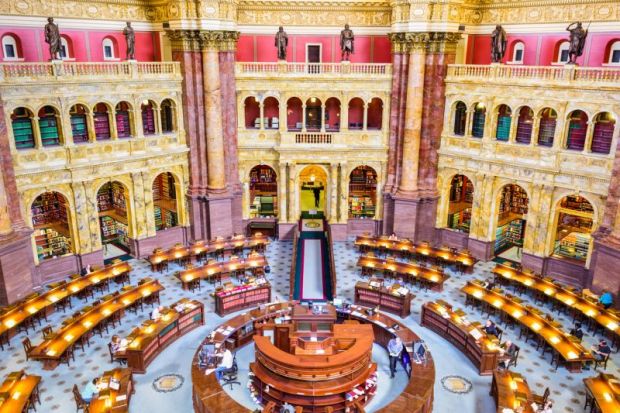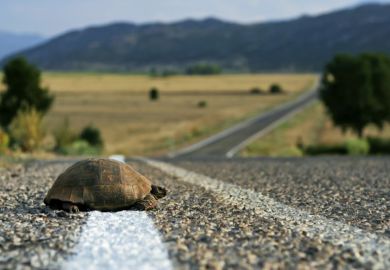“We should stop selecting leaders from a subset of Oxbridge egomaniacs with a humanities degree,” declared Dominic Cummings five years ago in a comment piece for The Times, a statement that takes a certain amount of chutzpah, given Cummings is an Oxbridge egomaniac with a humanities degree. Now that Cummings is special adviser to the prime minister, people are reading his (copious) writings with some attention. In one blog post, Cummings urged students who were interested in politics to “study maths or physics”, because politics degrees encourage people “to spread bad ideas with lots of confidence and bluffing”.
After considering who exactly is the one spreading bad ideas with lots of confidence and bluffing, it is hard to feel anything other than weariness at the prospect of yet another person running the country thanks to a humanities degree telling everyone else not to get a humanities degree. The prime minister, for one, seems rather proud of his.
Meanwhile, earlier this year in the US, the Trump administration sought for the third year in a row to cut all funding to the National Endowment for Humanities and the National Endowment for the Arts, the two largest funders of humanities research across the United States. These funding bodies support research, archival preservation, digital humanities, as well as small historical societies, museums and cultural organisations that protect and cultivate the rich heritage of humanities research that stretches back 5,000 years.
This effort – which so far Congress has blocked – is consistent with the Trump administration’s attitude towards research and conservation in general. Anyone who is surprised to discover that the Trump administration doesn’t value knowledge hasn’t been paying attention. Indeed, his administration doesn’t appear interested in conserving much beyond its own wealth and power, but the humanities are the only research agencies that have faced repeated calls for elimination in their entirety. The Trump administration thinks that the world would be better without humanities research – whereas humanities research shows that the world would be better without the Trump administration.
Unfortunately, the widely circulating idea that the humanities are for dilettantes continues to take hold of our society. This notion always amuses me, in a slightly doleful way, because the word “dilettante” comes from the Italian “to delight” and originally meant one who cultivates art or literature because they bring delight. From there it came to describe a devoted amateur, and eventually a mere dabbler in the trivial. It seems to me fitting, somehow, that the modern world would come to see delight as trivial, a luxury we can’t afford in these stern times.
In 1780, the American statesman John Adams wrote to his wife Abigail of his reluctant decision to join the revolution: “I must study Politicks and War that my sons may have liberty to study mathematicks and philosophy. My sons ought to study mathematicks and philosophy, geography, natural history, naval architecture, navigation, commerce, and agriculture, in order to give their children a right to study painting, poetry, musick, architecture, statuary, tapestry, and porcelaine.” A world that could devote itself to studying arts and humanities was the ultimate goal Adams was fighting for, a revolutionary right, a democratic ambition.
Two hundred and fifty years later in 1931, a historian named James Truslow Adams (no relation to John, sadly) wrote a bestselling book called The Epic of America, in which he popularised the phrase “the American dream”. For Adams, the American dream was “not a dream of motor cars and high wages merely, but a dream of social order in which each man and each woman shall be able to attain to the fullest stature of which they are innately capable, and be recognised by others for what they are, regardless of the fortuitous circumstances of birth or position”. For Adams, the American dream was precisely not materialism; like dilettante, it is another term that has suffered a complete reversal in meaning.
At the end of his book, Adams offered “a perfect …concrete example of the American dream”: the public reading room at the Library of Congress, “seats filled with silent readers, old and young, rich and poor, black and white, the executive and the laborer, the general and the private, the noted scholar and the schoolboy, all reading at their own library provided by their own democracy”.
Democratised access to knowledge, and therefore to self-determination and empowerment, that was the American dream. Who today would offer a public library as the perfect symbol of the idea? But central to Enlightenment concepts of liberal democracy was the democratisation of education: the provision of knowledge to the citizenry at large which led to the founding of public libraries, the writing of encyclopaedias, the establishment of state education systems and provisions for universal education and the opening up of access to higher education, and ultimately even to projects like Wikipedia.
I am often asked, as someone with the title “chair of public understanding of the humanities”, just what the humanities are. For me, the humanities are the study of the human world, just as the sciences are the study of the natural world. This means that the two overlap, intersect, and are mutually dependent and complementary. If we don’t need research into the human world that means we don’t need to better understand contemporary debates, or preserve community heritage, or safeguard vulnerable cultures, or understand how beliefs work, or think about identity, or question ethics.
As I write, we are preparing to launch the fifth annual Being Human Festival, the UK’s national festival of the humanities, which takes place all over the country at the end of November. Our theme for 2019 is “Discoveries and Secrets”, and we’ve invited humanities researchers from Belfast to Dundee, Swansea to Kent and everywhere in between to create free events for the public that connect their discoveries and uncovered secrets with their communities’ interests. Tens of thousands of people attend these events each year, people who are inspired by curiosity about the human world.
One of the discoveries that I made in researching my nation’s past, in order to better understand its present, was an American journalist named Dorothy Thompson, who in 1939 was voted the second most influential woman in the country after Eleanor Roosevelt.
Today she is unjustly forgotten, but she became one of the foremost opponents of America First, the committee that sought to keep the United States out of the Second World War (and gave Donald Trump one of his favourite slogans). Charles Lindbergh became America First’s spokesman, and Thompson, who had watched the rise of European fascism firsthand as a foreign correspondent and devoted herself to understanding it, had no time whatsoever for Lindbergh. “Colonel Lindbergh’s inclination toward Fascism is well known to his friends,” she wrote in September 1939, responding to Lindbergh’s first radio address urging America to stay out of the war. “‘Pity, sentiment and personal sympathy’ play a small part in his life. On the other hand he has a passion for mechanics and a tendency to judge the world and society purely from a technical and mechanical standpoint. The humanities, which are at the very center and core of the democratic idea, do not interest him, and he is completely indifferent to political philosophy.”
The implication was clear: Lindbergh was bound to find an affinity with what had for some time been known as “the Nazi machine”.
“The essence of the democratic idea,” Thompson declared, is “not mechanical but spiritual. It is not comprehended by such phrases as ‘majority rule,’ or ‘representative government,’ or even ‘economic equality.’” Majority rule at the time was supporting “the most flagrant despotism” in fascist countries, while “people are actually fooled by the popular plebiscites under which the masses are cajoled, bought and propagandized or terrorized into putting a ‘yes’ on some ballot or other”.
We continue to pursue machines, as if the universal application of technology can solve all of our problems. But the need to assert our humanity in a machine age has not changed. If anything, our world of prosthetic and increasingly intelligent machines has made questions about being human even more urgent. Education in the humanities is how we can share in the collective human mind, understand our place in a changing world and enfranchise ourselves as citizens.
Thompson was right that the humanities “are at the very center and core of the democratic idea”, and to my mind it’s no coincidence that the democratic societies finding themselves in crisis today are also the ones that keep telling themselves the humanities don’t matter.
Sarah Churchwell is chair of public understanding of the humanities and a professorial fellow in American Literature at the School of Advanced Study, University of London.
Sarah will be part of THE's Big Debate at THE Live on 28 November. Find out more and register.
Register to continue
Why register?
- Registration is free and only takes a moment
- Once registered, you can read 3 articles a month
- Sign up for our newsletter
Subscribe
Or subscribe for unlimited access to:
- Unlimited access to news, views, insights & reviews
- Digital editions
- Digital access to THE’s university and college rankings analysis
Already registered or a current subscriber? Login




